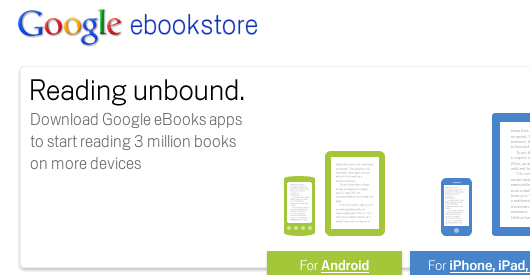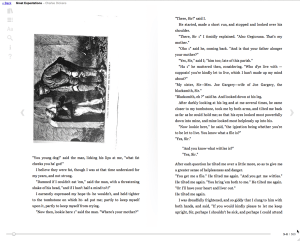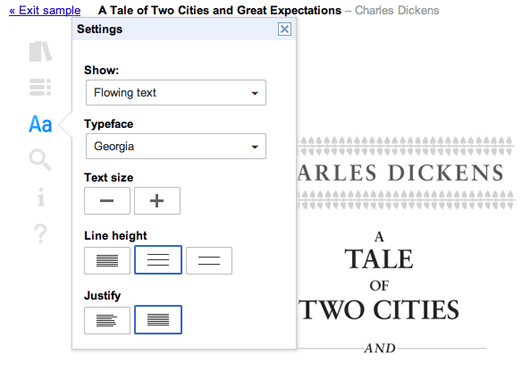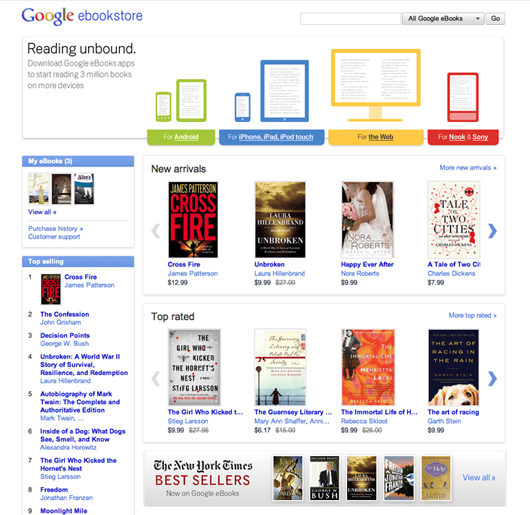
Today saw the launch of the long-awaited Google eBookstore. It’s one of the biggest outlets for ebooks with over 3 million titles available now, including free public domain books as well as all the top sellers from big publishers you see in the Kindle store or Apple’s iBookstore.
Bare-Bones eBookstore
Compared to the polish of Apple’s iBookstore or the Kindle Store, Google’s eBookstore is downright homely. The familiar blue and white motif hasn’t changed, and books in searches are presented in a regular grid of covers. Will the power of Google be enough to make the eBookstore a success?
A few things stood out for me in the launch of the Google eBookstore:
- On the horizon is the huge trove of books Google has been scanning for the last 5 years or so. This activity, which in many ways has dealt in the worst possible way with the rights of authors, has a proposed settlement that is still pending before the courts. When it is resolved, all those millions of books are slated to go straight to the eBookstore.
- Books in the eBookstore are either ePub books—with text that’s completely reflowable and with changeable fonts—or they are scanned pages of books. These scans can be enlarged or reduced but otherwise they can’t be manipulated.
Unfortunately, the only way you can tell a book is scanned is by a small note next to the “buy” button. For scanned books, it says “better for bigger screens.” It seems like this information ought to be part of the book’s detail page, don’t you think?
- Google has done an end run around the device makers. In a way it’s similar to Amazon’s release of its Kindle app for the iPad right after the tablet came out. But Google has gone one better. The eBookstore and its millions of ebooks will be available on every internet-connected device you can think of: PCs, smartphones, tablets, you name it. The number of Android and Apple smartphones and tablets alone could reach 100 million this year. Plus, the ePub books from the eBookstore will be usable on every other ebook reader except Kindle. That’s a huge market.

Click to enlarge. The reading pane in Google eBooks. Menu at upper left, progress bar at the bottom, page turners at each edge. Note the total disregard for the reader in placing the illustration in this ePub file.
- The Google eBookstore is completely cloud-driven. Rather than the Kindle or iBooks model of downloading your purchase to a device, the eBookstore is where your purchase lives. You surf there to read your book, whether you use your iPhone on the train, your iPad sitting out on the porch, or your PC while at your desk. And since the book itself is centrally located, it keeps your place each time you log on to read it. That’s convenient.
- For the first time, independent booksellers are getting to participate in the move to ebooks. This is from Jefferson Graham in USA Today:
(Google) also offers an alliance with independent bookstores that will for the first time allow them to sell Google e-books on their store sites and share the proceeds. “With Amazon and Apple, we couldn’t do it — it was a proprietary, closed system,” says Michael Tucker, president of the American Booksellers Association. “Now we can.”

Settings menu for ePub books. Font choices are Arial, Georgia, Times New Roman, Trebuchet and Verdana
There are a lot of unknowns around the eBookstore, too:
- Google is not known as a retailer. Will readers want to buy from a search engine company?
- Will they really have customer service?
- Will browsers prefer the polished presentations of Apple’s iBookstore and the Kindle Store to Google’s bare-bones, industrial esthetic?
- Are readers willing to read books in their browsers?
The Future is Now
Whatever you think of Google, its eBookstore, of eBooks in general, it’s apparent that the move to digital text is picking up speed. It’s hard to remember that only a year ago we were speculating about what the iPad would be called, and whether anyone would buy it.
Text is finding its way onto devices everywhere. It’s trivial today to walk around, as I do, with the complete works of Shakespeare and dozens of other books, reference works, novels, travel books, texts and piles of PDF reports on a small device in my pocket. How did that happen? And where will it lead?
As self-publishers, huge new markets of people hungry for information, for training, for entertainment are gaining constant, almost effortless access to storehouses of books and texts of many kinds. We need to be in those markets to take advantage of this truly revolutionary shift in the making, selling and reading of books.
Ed: After I published this article, I heard from the people at Newsy, the video news analysis company that produces terrific short videos. I usually watch them the iPad. They had a useful story that runs under 2 minutes on the Google eBookstore. Check it out:
Multisource political news, world news, and entertainment news analysis by Newsy.com



